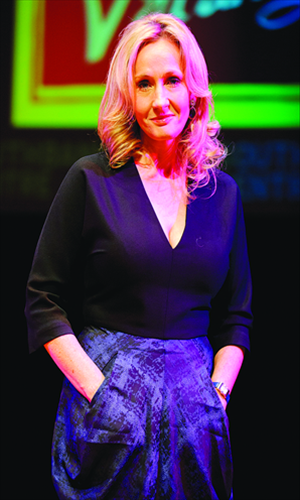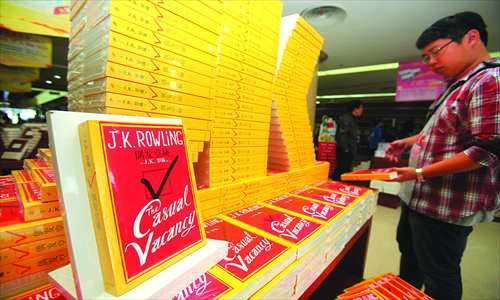Darkness without the magic


Recently released The Woman in Black is a film starring Daniel Radcliffe as Arthur Kipps, the same role his Harry Potter "father," Adrian Rawlins, played in 1989. Three years ago, For Him Magazine selected Emma Watson as one of the sexiest women in the world. These famous "child actors" featured in a story adored by millions of children and youngsters all around the globe are now adults. No wonder the creator of the Harry Potter series, J. K. Rowling, wanted to write a grown-up tale, though the new work may be too much of a departure for Potter lovers.
Starting from death and ending with death, The Casual Vacancy represents a dark and rather cold world full of dislikable people. This story - rife with drugs, swearing, crime and questionable morality - takes readers to a place that seems like the opposite end of the universe from the brave Potter and his charming friends. However, what has stirred up discussion among Chinese readers goes beyond the content of the book. Firstly, what is a "casual vacancy" anyway?
Love it or hate it
Oufa Kongque, the direct translation of "casual vacancy," is an unfamiliar phrase. Ren Zhan, one of the translators of the book, told the Global Times that although the team of translators did not decide on this Chinese title, they spent a long time researching a proper Chinese word.
"We found a similar concept in Hong Kong but not in the Chinese mainland," said Ren. Initially, the Chinese title was "linshi kongque," which is more like "temporary vacancy" in English. Many people find "linshi kongque" makes more sense for Chinese readers than the final title. Others see it as a less accurate translation when considering specific incidents described in the book.
"You have to finish reading to understand the title," said Li Tingting, 28, a reader from Dalian, Liaoning Province.
For Ren, the parts she found difficult to translate, such as descriptions relevant to healthcare, education, elections and social warfare, might also be obstacles for readers. "Plus, the whole tone is slow or sometimes dull. I was worried if readers would be interested in the unfamiliar environment and characters," said Ren.
When Harry Potter was introduced to China, the first three books came out together. Readers described them as "very readable" since many of them would stay up late to catch the next chapter. But for the new release, the introduction of so many characters at the beginning puts readers off, especially for people who have difficulty remembering foreign names; they can easily get lost within the first 100 pages.
Li offered this suggestion: "Draw a family tree and make notes on each one."
Despite the revolutionary makeover, as long as the name J.K. Rowling appears on the cover of a book, Harry Potter almost without a doubt comes immediately to mind.
"The comparison is inevitable," said Ren. For Rowling fans, all their love and admiration were built upon the reading experience of Harry Potter. It is difficult to totally exclude that memory when reading The Casual Vacancy. Even the realization that it is completely unrelated to Harry Potter is a kind of comparison or reference. With that reference, Potter fans seem to express a love or hate relationship with Vacancy.
Ren said, "Many Potter fans shared with me that they particularly find the descriptions of the environment and young characters similar to Harry Potter," but admitted she does not share that opinion.
Li said if she had not known that Rowling wrote this book, she would not think it was her work, and that is why she loves it. The conclusion for Ren is that the people most likely to be one of the first to read and love the book will be Potter fans, and the first group to hate it will also be Potter fans.
More than political
Rowling takes a clear political stance in The Casual Vacancy. Her criticism of the middle class - the warnings and worries about the consequences of being selfish and cold blooded - are highlighted in many reviews. Jan Moir from Daily Mail described it as "more than 500 pages of relentless socialist manifesto masquerading as literature crammed down your throat."
However, Chinese readers seem to have less of a connection with the issue of class.
"Maybe it's because the middle class in China is not a developed, mature and solid group yet. But a more important reason is that the book covers much more than that," said Wu Wenjuan, editor of the Chinese version. She considers it unfair to categorize a book, which mixes so many detailed events, stories and people, by one single aspect.
Wu told Global Times how she was particularly impressed by the ending. "Rowling sees the middle class as the backbone of the society, carrying more responsibility. But the dark side of human nature can happen to anyone. Setting aside class issues and social background, the story can still resonate with (Chinese)," she said.
Rowling has admitted crying for her ending; so does Li. Family problems, hidden conflicts between couples, prejudice - all these issues are depicted in the book. Although the specific events and environment may not be applicable to the situation in China, and the feelings of each reader will differ, a connection still exists.
A serious bestseller
Ren likens Rowling's writing style to Dickens and Jane Austin. She pointed out that a contradiction lies with the fact that Rowling intended to write a serious work of literature, yet the publisher, book sellers and marketing process still positioned it as a popular novel. Nevertheless, the result has been a success for Rowling. Not only have there been record-breaking pre-orders on Amazon, but also long queues in the bookshops of Shanghai when the Chinese version was released two weeks ago.
According to Wu, the feedback from the Chinese market so far was beyond expectation. Rowling's reader base is so large that it includes fans of all types of literature.
"You can't expect Potter fans will all love this book, but at least most of them will be curious about it," said Wu.
Rowling wanted to leave behind the Potter phenomenon, and she was precise in how she went about that. The Casual Vacancy, with all its unsavory characters, is written with both sympathy and anger. But her talent to drive such topics into the mainstream of public discourse will determine if this work will ever be classified as a masterpiece of literature.